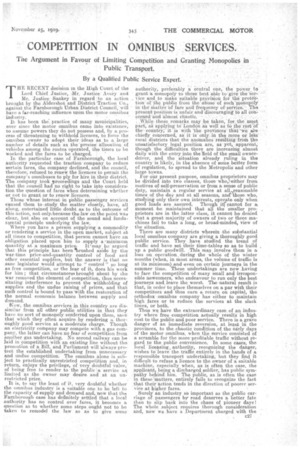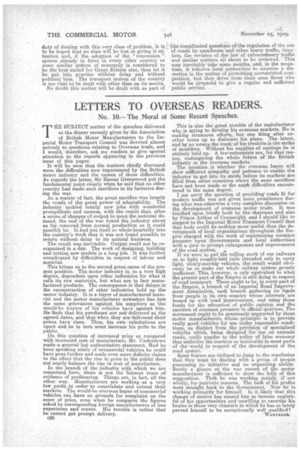COMPETITION IN OMNIBUS SERVICES.
Page 19

Page 20

If you've noticed an error in this article please click here to report it so we can fix it.
The Argument in Favour of Limiting Competition and Granting Monopolies in Public Transport.
By a Qualified Public Service Expert.
THE RECENT decision in the High Court, of the Lord Chief Justice, Mr. Justice Avory and Mr. Justice Sankey in regard to an action brought by the Aldershot and District Traction Co., against the Farnborough Urban District Council,"-will have a far-reaching influence upon the motor oninibua industry. It has been the', practice of -many municipalities, over since the motor omnibus cAme into existence, to assume powers they do not possess and, kiy a process of threatening to withhold licences,to force the omnibus owner to adopt their ideas as to a large number of details such as theprecise allocation of vehicles among the routes operated, the times to be worked and the fares to of charged. In the particular case of Farnborough, the local authority requested the traction. company to reduce sertain fares, the company declined, and the council, therefore, refused_to.renew the licences to permit the company's omnibuses to ply for hire in their district. The company .took Troceedings and the Court held that the council had no right to take into consideration the question of fares when determining whether.
or not to grant or to renew licences. .
Those whose interest in public passenger services caused them to ,study the matter closely, have, all along, entertained little doubt as to the outcome of this action, not only/beeause the law on.the point waa clear, but also on account of the sound and fundamental principle underlying the law.
'Where you have a person .supplying a commodity or rendering a service in the open market, subject at all times to competition, that person cannot have an obligation placed upon him to supply a ,minimum quantity at a maximum price... It'inay be argued that, this principle has been !brushed aside by the War-time price-and-quantity control of food and other essential supplies, but the answer ig that no sane legislator would attempt to " control "so long as free competition, or the fear of it, does his work for him ; that circumstancese brought about by the war removed the element of competition, thus necessitating interference to prevent the withholding of supplies and the Undue raising of prices, and that such control is bound to pass -with the, restoration of the normal economic balance between supply and
demand. _ .
Now, the omnibus services in this country are dis-. similar from all other public utilities in that they have no sort of monopoly conferred upon them, save. that which they often acquire by' rendering a thoroughly good service at a moderate charge. Though an electricity company may compete with a as company, the latter can have no fear of competition from Another gas undertaking. No second railway can be laid in competition with an existing line -without the promotion of a Bill, and Parliament will always protect the established undertaking from unnecessary and undue competition: The omnibus alone is subject to practically unrestricted competition and, in return, enjoys the privilege, of very doubtful value,of being free to render to the public a service as limited as the owner may desire and at an unrestricted price.
It is, to say the least of it, very doubtful whether' the omnibus industry is a suitable one to be left to the capacity of supply and demand and, now that the rarnborough case has definitely settled that a. local authority has no control over fares, it becomes a question as to whether some steps ought not to be taken to remodel the law so as to give some authority, preferably a central one, the power to grant a monopoly to those best able to give the ser, vice and to make suitable provision for the protec
tion of the public from the of such monopoly in the inatter Of fare and frequency of-service. The present positionis unfair and discouraging to all con-eerned.and -almost Chaotic..
. While these remarks may lhe taken, for the most part, as applying to London as well as to the rest of
the . country; it With "the provinces that -We are chiefly concerned, as it isonly in the more or less' rural districts that the anciinalies resiilting.froin the unsatisfactory legal position are, a1 'yet, apparent, though the difficulties there are increasing almost daily with the entry into the Yield of the small ownerdriver, and the situation already ruling in the country is likely, in the absence of some better form of regulation, to spread to the Metropolis and other
large towns.
For our present purpose, omnibus proprietors may be divided into two classes, those who,Peither from motives of: self-preservation or from a sense of public duty, maintain a regular service at allareasonable times of the daY and at all seasons, and-those who, studying only their own interests, operate only when good loads are assured. Though itr eannot for a4 moment 'be maintained that all the smaller proprietors are in the latter class, it cannot be denied that a great majority of owners of two or three machines fail to take a long, or broad-minded, view of the situation.
There are many districts wherein the substantial local omnibus company are giving a thoroughly good public , service. They have studied the trend of traffic and have set their time-tables so as to build up a public goodwill. This may, involve them in a loss on operation, during the whole of the winter months (when, in most areas, the volume of traffic is at its minimum) .and even on certain journeys in the summer. time. These undertakings are now , having to face the competition of many small and irresponsible newcomers, who endeavour to run only the best -journeys and, leave the worst. The natural result is that, in order to place themselves on a par with their competitors and thus earn a return on capital, the orthodox 'oranibus company has either to maintain high fares er to reduce the services at the slit& times, or both.
Thus we have the extraordinary case of an industry where free competition actually results in high cost to the public and poor am-vice. There is a grave danger of an immediate reversion, at least in the provinces to the chaotic -Condition of the early days of the motor omnibus, when the service conaisted of a scramble for the more 'profitabletraffic without regard to the public convenience. In some cases, the local licensing, authority, recognizing the danger, wishes to leave the traffi-c entirely in the hands of a responsible transport undertaking, but they find it difficult to refuse a licence to the owner of a suitable machine, especially when, as is often the case, the .4pp.liearit, being i discharged soldier, has public sympathy behind him. The public, as is often the case in these matters, entirely fails to recognize the fact that their Action tends in the direction of Poorer serviee at higher fares. Surely an industry so important as the public carriage cif passengers by. road deserves -a better fate than to slip back into the chaos of pioneer days! The whole _subject requires thorough consideration and, now we have a Department charged -with the duty of dealing with this very class of problem, it is to be hoped that no time will be lost in giving it attention and, if the adoption of the " concession " system .already in force in every other country or some similar system of monopoly is considered to be the best suited for Great Britain also, then let it be put into practice without delay and without political bias. The transport system of the country is too vital to be dealt with other than on its merits.
No doubt this matter will be dealt with as part of the complicated questions of the regulation of the use of roads by omnibusee and other heavy traffic, taxation, the revision of the law of extraordinary traffic and similar matters all about to be reviewed. Thia may inevitably take some months, and, in the meantime, it behoves local authorities to exercise a discretion in the matter of permitting unrestricted competition, lest they drive from their area those who would be prepared to give a regular and sufficient public service.








































